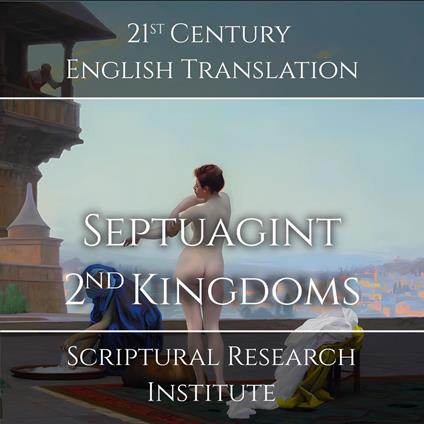Septuagint - 2n? Kingdoms
In the mid-3rd century BC, King Ptolemy II Philadelphus of Egypt ordered a translation of the ancient Hebrew scriptures for the Library of Alexandria, which resulted in the creation of the Septuagint. The original version, published circa 250 BC, only included the Torah, or in Greek terms, the Pentateuch. The Torah is the five books traditionally credited to Moses, circa 1500 BC: Cosmic Genesis, Exodus, Leviticus, Numbers, and Deuteronomy. The first edition was followed by the second, before 200 BC which added the books of Joshua, Judges, and Ruth, which was later known as the Octateuch. Around 200 BC the four books of the Kingdoms and two books of the Paralipomena were added to the Septuagint, along with the two books of Ezra the Scribe. The four books of the Kingdoms are believed to have been translated into Greek and added to the Septuagint around 200 BC when a large number of refugees fled from the war in Judea and settled in Egypt. The four books of the Kingdoms would later become two books in the Masoretic Texts, the books of Samuel and Kings. Subsequent Latin and English translations of the Masoretic Texts labeled these books as 1st and 2nd Samuel and 1st and 2nd Kings. The Septuagint's 2nd Kingdoms is the book called 2nd Samuel in most Catholic and Protestant Bibles, and 2nd Kingdoms in Orthodox and Coptic Bibles. This version differs slightly from the later Masoretic book of Samuel, although all three are generally similar. While a Greek simplification of the text is the simplest explanation for the less-confusing narrative, it cannot explain why the Greek translation has transliterated Hebrew words that are no longer in the Masoretic version. The origin of 2nd Kingdoms, along with the other five books of Kingdoms and Paralipomena, is a matter of great debate among scholars. The Bava Basra tractate of the Talmud, reports that the first 25 chapters of Masoretic Samuel, and therefore the first 25 chapters of 1st Kingdoms, was written by the prophet Samuel, and the rest of Masoretic Samuel, which would be chapter 26 through 31 of 1st Kingdoms and the entire book of 2nd Kingdoms was written by the prophets Gad and Nathan. Samuel, Gad, and Nathan are all mentioned in 1st and 2nd Kingdoms, however, most biblical scholars have rejected the idea that they had anything to do with the authorship of these books for the past few hundred years. Almost all scholars in every era have agreed with the idea that the six books were based on the older, now lost, books of the Chronicles of the Kings of Samaria and Judea mentioned in the later books of Kingdoms. These six later books are generally accepted as having been written in the Babylonian or Persian era and then redacted in the Greek era or Hasmonean dynasty, however, the origin of the earlier works is a matter of debate. The Hebrew language of the second half of Samuel (2nd Kingdoms) is less archaic than the language of the first half of Samuel (1st Kingdoms), suggesting it was written later than the text that became 1st Kingdoms. The Greek translation also included a number of inconsistencies with the translations of 1st, 3rd, and 4?? Kingdoms, as well as the following book of 1st Paralipomenon, implying it was redacted sometime after the Hasmonean redaction, but before the Codex Vaticanus was prepared in the 4?? century, which includes the oldest copy of the Septuagint's 2nd Kingdoms currently in existence.
-
Autore:
-
Durata in (hh:mm:ss):02:17:12
-
Anno edizione:2023
-
Editore:
Formato:
Gli Audiolibri venduti dal nostro sito sono in formato MP3 e protetti da un DRM proprietario Kobo.
Compatibilità:
Gli Audiolibri venduti dal nostro sito possono essere ascoltati sul tuo smartphone o tablet tramite la APP gratuita Kobo Books scaricabile da iOS o Android. Gli Audiolibri non possono essere scaricati in locale o trasferiti su un client di ascolto diverso da quello fornito tramite Kobo. Non è possibile ascoltare gli audiolibri con la Kobo APP Desktop. Puoi ascoltare gli Audiolibri tramite determinati eReader Kobo, utilizzando cuffie o casse con Bluetooth. Visita la pagina degli eReader per avere maggiori dettagli.
Cloud:
Gli Audiolibri venduti singolarmente dal nostro sito sono immediatamente sincronizzati sul tuo account personale in automatico. Successivamente all'acquisto, sono subito disponibili all'ascolto tramite i client di lettura Kobo compatibili.
Clicca qui servissero ulteriori informazioni



